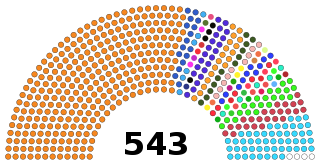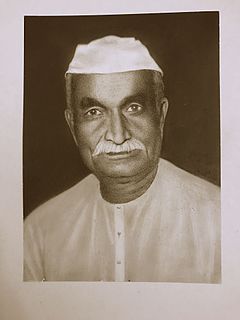Related Research Articles

The Rajya Sabha or Council of States is the upper house of the bicameral Parliament of India. It currently has a maximum membership of 245, of which 233 are elected by the legislatures of the states and union territories using single transferable votes through Open Ballot while the President can appoint 12 members for their contributions to art, literature, science, and social services. The potential seating capacity of the Rajya Sabha is 250, according to article 80 of the Indian Constitution. Members sit for staggered terms lasting six years, with elections every year but almost a third of the 233 designates up for election every two years, specifically in even-numbered years. The Rajya Sabha meets in continuous sessions, and unlike the Lok Sabha, being the lower house of the Parliament, the Rajya Sabha, which is the upper house of Parliament, is not subjected to dissolution. However, the Rajya Sabha, like the Lok Sabha can be prorogued by the President.

The Lok Sabha, or House of the People, is the lower house of India's bicameral Parliament, with the upper house being the Rajya Sabha. Members of the Lok Sabha are elected by an adult universal suffrage and a first-past-the-post system to represent their respective constituencies, and they hold their seats for five years or until the body is dissolved by the President on the advice of the council of ministers. The house meets in the Lok Sabha Chambers of the Sansad Bhavan, New Delhi.

The Parliament of India is the supreme legislative body of the Republic of India. It is a bicameral legislature composed of the President of India and the two houses: the Rajya Sabha and the Lok Sabha. The President in his role as head of legislature has full powers to summon and prorogue either house of Parliament or to dissolve Lok Sabha. The president can exercise these powers only upon the advice of the Prime Minister and his Union Council of Ministers.
The 14th Lok Sabha was convened after the 2004 Indian general election held in four phases during 20 April – 10 May 2004, which led to the formation of first Manmohan Singh ministry (2004–2009). Indian National Congress-led United Progressive Alliance won 62 more seats than previous 13th Lok Sabha. The Lok Sabha is the lower house in the Parliament of India. 8 sitting members from Rajya Sabha, the Upper House of Indian Parliament, were elected to 14th Lok Sabha after the 2004 Indian general election.
Baby of the House is the unofficial title given to the youngest member of a parliamentary house. The term is most often applied to members of the British parliament from which the term originated. The title is named after the Father of the House, which is given to the longest serving member of the British and other parliaments.

The First Lok Sabha was constituted on 17 April 1952 after India's first general election. The 1st Lok Sabha lasted its full tenure of five years and was dissolved on 4 April 1957. The First Session of this Lok Sabha commenced on 13 May 1952.

Padanatha Mohammed Sayeed was a leader of the Indian National Congress party. He was a member of Lok Sabha for ten consecutive terms from 1967–2004. representing Lakshadweep.
The 13th Lok Sabha is the thirteenth session of the Lok Sabha. It was convened after 1999 Indian general election held during September–October 1999.

General elections were held in India in April–May 1996 to elect the members of the 11th Lok Sabha. The result of the election was a hung parliament, which would see three Prime Ministers in two years and force the country back to the polls in 1998. Atal Bihari Vajpayee of Bharatiya Janata Party, the single largest party to win this election, winning 67 more seats than previous 10th Lok Sabha, formed the government which lasted for only 13 days.

List of Members of the 4th Lok Sabha, elected February–March 1967. The Lok Sabha is the lower house in the Parliament of India.13 sitting members from Rajya Sabha were elected to 4th Lok Sabha after the 1967 Indian general election.

List of Members of the 3rd Lok Sabha, elected February–March 1962. The Lok Sabha is the lower house in the Parliament of India. The election was held for 494 seats out of which Indian national congress won 361 seats. 14 sitting members from Rajya Sabha were elected to 3rd Lok Sabha after the 1962 Indian general election.
Uddaraju Ramam was an Indian politician. He was a parliamentarian and a leader of peasants movement.He was having 3 sons and 2 daughters.
S. V. Krishnamoorthy Rao was an Indian Politician belonging to the Indian National Congress. He was a member of the Upper House of the Indian Parliament the Rajya Sabha from 1952 to 1962.He was also the Deputy Chairman of the Rajya Sabha.He was elected to the Lower House of Parliament the Lok Sabha from the Shimoga, Mysore State in 1962 and was the Deputy Speaker of the Lok Sabha from 1962 to 1967.

Bibhuti Mishra was an Indian politician. He was elected to the Lok Sabha, lower house of the Parliament of India from Motihari, Bihar in 1952,1957,1962,1967 and 1971 as a member of the Indian National Congress. He was defeated in the 1977 elections and Thakur Ramapati Singh was elected.
Jadunath Kisku was an Indian politician and a member of the Communist Party of India (Marxist) political party. He was elected to the Lok Sabha, lower house of the Parliament of India in 1977 from Jhargram constituency in West Bengal.
Dr Pashupati Mandal was an Indian politician. He was elected to the 3rd and 4th Lok Sabha, lower house of the Parliament of India from Vishnupur, West Bengal as member of the Indian National Congress.
Kattiannan Arjunan is an Indian politician of the All India Anna Dravida Munnetra Kazhagam (AIADMK).
Krishna Chandra was an Indian politician. He was elected to the Lok Sabha, the lower house of the Parliament of India from the Jalesar, Uttar Pradesh constituency of Uttar Pradesh as a member of the Indian National Congress.
Laloo Oraon, also spelt Lalu, is an Indian politician. He was a Member of Parliament, representing Lohardaga, Bihar in the Lok Sabha the lower house of India's Parliament as a member of the Janata Party.
References
- ↑ Lok Sabha Debates. Lok Sabha Secretariat. 1967. pp. 255–. Retrieved 18 November 2018.
- ↑ India. Parliament. Lok Sabha (1970). List of Members of Lok Sabha Showing Permanent and Delhi Addresses and Telephone Numbers. Lok Sabha Secretariat. p. 134. Retrieved 18 November 2018.
- ↑ "General Elections, India, 1967 - Constituency Wise Detailed Results" (PDF). W. Election Commission of India. Archived from the original (PDF) on 18 July 2014. Retrieved 18 November 2018.